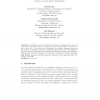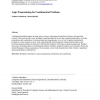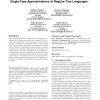219 search results - page 5 / 44 » Combinatorial Complexity of Regular Languages |
129
click to vote
FOSSACS
2008
Springer
15 years 1 months ago
2008
Springer
The problem of converting deterministic finite automata into (short) regular expressions is considered. It is known that the required expression size is 2(n) in the worst case for ...
87
Voted
JUCS
2010
14 years 10 months ago
2010
: A language L is the orthogonal concatenation of languages L1 and L2 if every word of L can be written in a unique way as a concatenation of a word in L1 and a word in L2. The not...
AIR
2010
15 years 7 days ago
2010
Combinatorial problems appear in many areas in science, engineering, biomedicine, business, and operations research. This article presents a new intelligent computing approach for...
PODS
2010
ACM
15 years 5 months ago
2010
ACM
XML Schema Definitions (XSDs) can be adequately abstracted by the single-type regular tree languages. It is wellknown, that these form a strict subclass of the robust class of re...
87
Voted
CORR
2008
Springer
15 years 6 days ago
2008
Springer
Using the concept of discrete noiseless channels, it was shown by Shannon in A Mathematical Theory of Communication that the ultimate performance of an encoder for a constrained sy...



